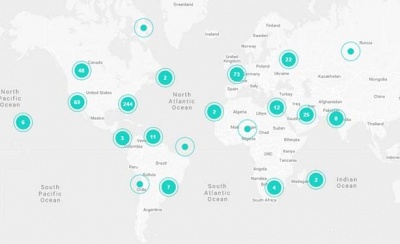Taking Logistics & Shipping in Stride in a Pandemic

As an international company, WhiteWater understands the complexities of operating in and shipping to far reaching locations around the globe. We’re lucky to have an experienced logistics team who can help steer us through the troubled waters of this COVID-19 pandemic. And while it might not be business as usual, they are more than prepared to deal with the ever-changing disruptions presented by this crisis.
Although vastly different from a commercial flight which flies hundreds of people at once, ships, shipping lanes, and ground shipping have also been impacted by the COVID-19 pandemic, albeit less so, by the lockdowns that have been imposed by many nations worldwide.
Leaning on our Experienced Logistics Team
Our logistics manager, Zori Kitanova, has been hard at work over the past few months, managing our logistics and shipping, so that all of our materials get to and from their destinations as smoothly as possible. Although the process has proven to be challenging at times, the team has held up remarkably well, enabling several projects in China to resume construction work after a few months in lockdown, and several projects in the US to continue construction work throughout the pandemic.
In addition to Zori, our team is also made up of highly experienced people who are experts at thinking on their feet and solving problems. They’ve managed to move goods during this pandemic by upping their juggling skills and have learned to be more responsive during a very volatile and dynamic time. Normally, logistics and shipping require a lot of planning and preparation, but during a crisis like this, even having the best outline schedules and contingency plans are sometimes not enough. The team has adapted to the situation by negotiating reasonable rates and stopping and diverting shipments if there is a perceived risk on the horizon without jeopardizing our clients’ deliveries. It takes a lot of skill and flexibility in order to accomplish such a delicate task.
Impact on Ocean Shipping Routes
Ocean shipping routes have seen cuts in sailings due to reduced demand, making the task of coordinating shipments more complicated, but with contingency plans in place, this issue can be mitigated. Zori offers some insights here into the kind of changes that have been seen recently in the freight market, with interruptions to service and declining routes.
“Since the initial coronavirus outbreak and lockdown during the Chinese New Year holidays, there have been 212 cancelled sailings globally. The largest capacity withdrawal has been in the Asia-Europe trade route, where 29-34% of the capacity has been lost. Container volumes, on the other hand, have dropped by 15% on the Asia-North American West Coast route, 13% for the Asia-North American East Coast route, 12% for the Asia-Middle East route, and 10% in the Asia-Latin America route,” she explained.
With several countries in Europe, such as Germany and Italy beginning to restart their economies, we are optimistic that the reduction in ocean shipping routes are temporary, and while they may not return to pre-pandemic levels in the near future, we can rest assured in our ability to continue keeping our products moving around the world smoothly.
Impact on Ground Shipping
The situation in ground shipping is somewhat different—some carriers have reduced fleet sizes due to driver safety concerns, however, as an essential service, freight continues to flow smoothly throughout Canada and through the US-Canada border. With both the US and Canadian governments making preparations for the reopening of the border and the economy, Zori doesn’t foresee restrictions or delays happening here.
Looking to the Future
One of the most significant changes that has happened in recent weeks is the digitization of previously manual tasks, such as document printing, authentication, and distribution. As Zori explains, “we believe that this pandemic has taught us the need for improved communication, flexibility, and improved data and information sharing across borders and global supply chains through the use of technology. It has also exposed the need for us to form stronger supply chain networks and to focus on risk management through strategic planning.”
At WhiteWater, we strive to find the silver lining in every cloud, and we believe that we’ll learn a lot of important lessons in the coming months that will make us stronger. Our team is striving to focus on supply chain optimization, further development of ERP, warehouse and transport module integration, and designing and refining processes, all of which will allow us to be even more agile and resilient in the future.


























